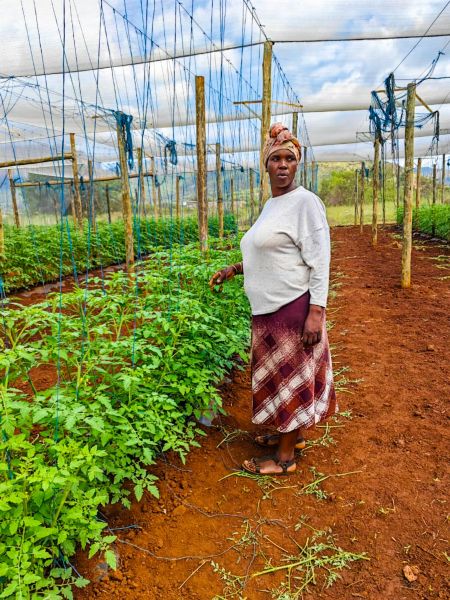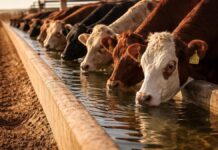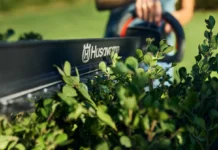When it comes to farming, it doesn’t matter whether your starting small or going all ]out big. More women farmers in South Africa’s rural areas are proving this by turning small farms usually less than 10 hectares into thriving operations that produce top-quality crops, most of the time rivalling those grown on large commercial farms. This Women’s Month, we honour the women who are planting the seeds of change in South Africa’s agricultural landscape.
Proving what can be achieved when you are not afraid of getting dirt under your fingernails and dedicated to making farming your future is Leydah Sekgobela from Polokwane, Limpopo whose 9.2-hectare farm produces marrows, green beans, baby corn, tomatoes and cherry peppers, says Mpudi Maubane PR, Communication and Sponsorship Manager of SPAR Group.
“What is remarkable is that despite the size of her operation, Leydah produces about 135 tonnes of product a year that is marketed through a SPAR Rural Hub and supplies a food canning company as well as packing operation. It came as no surprise when her incredible progress was recognised and named the “Most Improved Farmer of the Year” by Kagiso Trust’s Tyala Impact Fund last year in September 2024, an achievement that made all of us very proud” says Maubane.
“Leydah, has proved that emerging women farmers are fast becoming an agricultural force to be reckoned with. They are strong women who have demonstrated that with dedication and hard work, they can match the quality of produce from the fields of the biggest commercial farms with the resources and technologies that emerging farmers can only dream about.”
For Leydah, whose father was a small-scale farmer, the realisation that she wanted to become a farmer came when she worked as a teacher and realised that she would rather be an entrepreneur. Agriculture was a logical choice because of her family background and love of farming.
“I told myself that if farming was going to be my future, I was in it to make money,” she says, adding that she took the plunge into self-employment in 2013. Unlike many other farmers starting out, she identified her proposed markets but ensured she had a production contract in hand to secure sales.
“I began with peppadews but quickly realised this was a seasonal crop. To make the farm viable, I had to grow crops all year. I had to find cash crops. Spinach and cabbage, which can be grown all year round, proved the answer.”
“Then I had a cash crop but no market. I had to travel around shops and local markets to sell my vegetables. I didn’t have contracts but felt that my produce spoke for itself because of its high quality and would sell to shopkeepers and even hawkers.”
Leydah admits that coping with competition from other growers and getting her crops sold at realistic prices was the most significant challenge, and despite years of experience, it remains problematic.
“The tough bargaining around prices taught me that to be a successful farmer and salesperson, you must be reliable and offer quality produce. Once I had proved that I always delivered what I promised when I promised it, I found that I became a preferred supplier and that retail buyers would be loyal. I now have buyers who are prepared when times are tough to buy at decent prices.”
Leydah Sekgobela’s relationship with SPAR and the SPAR Rural Hub has been a “game changer” for her farm. The contracts she holds with them provide certainty regarding price, as long as quality is maintained, and give her the advantage of having a single customer purchase her entire crop and provide packing facilities.
This relationship has also provided her with the services of extension officers, loans for seeds and fertilizer, and even assistance with labor costs. An extension officer visits the farm every two weeks, and if a problem arises, she can send a picture to the officer to get advice or schedule a visit. The four-year relationship with SPAR began after her son met an employee who told him the company was looking for farmers they could contract.
“Our four-year relationship with SPAR started with a site visit as they were looking for farmers they could work with under SPAR Rural Hub. They came to our farm; they were impressed at first sight and that started the connection. At the time of their visit, we had cabbage on the land and immediately sold this to SPAR. We were also advised to grow cocktail tomatoes rather than the cucumbers we had been growing in tunnels and were not doing well. Today, we are producing about 20 tonnes of tomatoes a year and making profit.”
“Although we grew several different crops for SPAR, we are now concentrating on cocktail tomatoes and baby marrows.”
Lydah stresses that success in farming for profit depends on quality and reliability. Therefore, you should be constantly available and ready to get your hands dirty as a farmer.
“The fact is that even if you have trustworthy supervisors, they don’t know how much you have personally invested in the farm, what you have spent on buying seedlings, fertiliser and all the other farming needs which is all the factors that make your attachment to the land deep and lasting.”
“Giving back and encouraging others, particularly women, to enter farming is important, so we encourage young potential farmers to test their choice of agriculture as a career by working as interns on our farm.”
To SPAR, ongoing support for agriculture is focused on practical interventions, our involvement with agriculture and food security is based on helping to create an inclusive food system that includes emerging farmers, particularly the support and empowerment of female farmers,” says Mpudi
“SPAR helps small-scale farmers increase outputs and their ability to supply markets in urban centres. This strengthens local economies by ensuring that affordable prices are received for crops, spending takes place in communities, and employment opportunities are created by SPAR becoming the primary customer.”
“Through our two rural hubs in Limpopo, farmers are mentored and assisted with boosting their agricultural knowledge and production techniques. In addition, they receive assistance and support to manage their operational costs and buying capital assets. The result is that small-scale farmers can produce crops in commercial quantities.”








